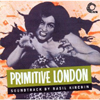 Perhaps uniquely, Basil Kirchin’s appreciators include Broadcast, Coil, Sean Connery, Elizabeth Taylor, Brian Eno, and Nurse With Wound. Included here is music from his first film score Primitive London (1965) and the gangland movie The Freelance (1971). Kirchin was a pioneering twentieth-century master of texture and mood. His inventive, multifaceted music still sounds light yet off-kilter, eerie yet peaceful, both futuristic and nostalgic.
Perhaps uniquely, Basil Kirchin’s appreciators include Broadcast, Coil, Sean Connery, Elizabeth Taylor, Brian Eno, and Nurse With Wound. Included here is music from his first film score Primitive London (1965) and the gangland movie The Freelance (1971). Kirchin was a pioneering twentieth-century master of texture and mood. His inventive, multifaceted music still sounds light yet off-kilter, eerie yet peaceful, both futuristic and nostalgic.
In the north London of December 1941, with the worst of The Blitz only just passed and rationing and nightly trips to the bomb shelter still in place, the teenage Basil Kirchin played drums in his dad’s jazz band. If that sounds gritty but humdrum, consider that The Kirchin Band evolved a highly percussive Latin-flavor which became so popular and respected that neither Sarah Vaughan nor Billy Eckstine would tour England without an assurance they would provide backing. Eckstine pronounced them the equal of the bands of Basie, Ellington, and Gillespie, and stated his disbelief that the group "aren’t American let alone that they are not coloured." Unusually, they had their own sound system which enabled Kirchin to record their performances. They were also recorded by George Martin, had movie star fans, and came near the top of several Melody Maker polls.
However, Basil Kirchin was not content to be, in his own words "a prisoner of rhythm." Born in Blackpool, he spent his last years in Hull. These towns in Northern England are on opposite (East/West) coasts yet only 111 miles apart. Kirchin, though, traveled much further, in both geographical and musical terms. Keen on exploring his own musical direction, he journeyed to India, Australia and the US. Upon returning to England, he embarked on various projects including writing music for imaginary and real films, and for the De Wolfe music library (with such excellent artists as Big Jim Sullivan, Tubby Hayes, Jimmy Page, and Kenny Wheeler). Kirchin also created his Worlds Within Worlds concept. This was an idea set in motion after a grant to purchase a cutting-edge Nagra tape recorder allowed him to slow down the sound of insects, birds, autistic children, gorillas, or whatever, to reveal sounds previously unheard. In this, he was miles ahead. (Years later, Eno would comment that slowing recorded sounds by more than fifty percent "does something to the timbre of sound...by bringing upper harmonics into hearing range".)* To these slowed sounds, Kirchin added cello, horns, and organ to produce two albums of pioneering musical soundscapes. Unfortunately, these have never heard been as intended: since Colombia and Island took turns to betray him and ruin his recordings.
The film Primitive London contains images as banal and sordid as those suggested by Kirchin’s weird, yet somehow "correct" mix of sounds, and a bizarre treat awaits its viewers. The score is by turns melancholy, melodic, repetitive, and sinister; tottering like a drunk in heels staggering home with the sun coming up on a beautiful day. Kirchin’s dreamlike atmospheres balance on the edge of oddness and optimism, without plunging headlong into either: a superb fit for the sense of tension which the film depicts, between the ordinary life of milk bottles and farms and that of wife-swapping and strip clubs. The recurring musical themes are simple and insistent yet Kitchin achieves contrast through varying pace and texture. Consequently, in the space of a few bars the mood can swing from sleazy to mundane and back again.
Kirchin’s film music is included in television productions and at least ten movies including Catch Us If You Can (a vehicle for the Dave Clark Five, 1965), I Start Counting (with Jenny Agutter, 1968), The Shuttered Room (Oliver Reed, 1967), and perhaps most famously The Abominable Doctor Phibes (starring Vincent Price, 1971). Also available on Trunk records by Basil Kirchin are Quantum, Charcoal Sketches/States of Mind, Abstractions of The Industrial North, and the slightly disappointing Particles. Also featured on Abstractions are selected cues from all the ten inch De Wolfe recordings from the same year (1966) including "Viva Tamla Motown" and "Pageing Sullivan" (named for the two featured guitarists).
The Primitive London release has the usual fine photographs and affectionate, enthusiastic and unpretentious sleeve notes we have come to expect from Trunk. Basil Kirchin deserves no less for if the histories of the genres of "library" and "ambient" music are ever set down, his name will be prominent in both. He was still working well into his 70s, hoping to leave signs to help younger people find their own ways to break out of creative constraints. "The challenge is to act before thinking," Kirchin remarked in 2003, just two years before his death.
* As quoted in Brian Eno: His Music and the Vertical Color of Sound by Eric Tamm.
Read More


